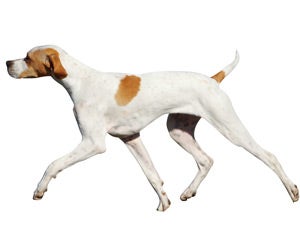Pointer
-
Overview
Pointers are graceful, athletic dogs built to run and hunt for hours at a time. They weigh between 45 and 75 pounds and stand up to 2 feet, 4 inches tall. The Pointer is a dedicated, serious dog who needs plenty of mental and physical stimulation to be well-behaved and happy. Their coats require minimal grooming, but they require lots of exercise and affection.
-
Personality
Pointers have the stamina to run for hours. To keep up with them and their insatiable appetite for activity, provide them with plenty of opportunities to exercise. They love to run and jog, but they especially love to be let loose to track a scent or scour your lawn for new sights and smells. If your Pointer is tired out with active outdoor play, he will quickly calm down and make a relaxed, gentle indoor companion. If he feels he hasn't had enough time to burn off steam, he can become anxious and destructive indoors.
Pointers were bred to work well with their owners, which makes them responsive and eager to please. Although they are also independent and confident, they respond well to consistent commands and gentle, trustful owners. They bond very closely to their owners and love to butter them up with their sweet, playful personalities once they have come to trust them.
-
Coat Care
Pointers are built to point at game, and it's evident from their elongated necks, sleek bodies and long, pointed tails. Their coats are short, smooth and sleek. Their coats often have white backgrounds and black, orange, dark brown or lemon markings. Some Pointers have speckles and spots, known as ticking, along the white areas of their coats, and the ticking can occasionally be seen in more than one color.

Although Pointers don't need to be groomed daily, they do need to be thoroughly brushed with a bristle brush or a hound glove once a week to remove dead hairs and help the coat maintain its natural sheen.
Pointers do not develop an odor, but they should be bathed four times a year, with each season.
Pointers can be sensitive about their feet, so help them become accustomed to being groomed around their ears and paws when they are puppies by trimming longer hairs and brushing those areas gently.
Many dog owners are apprehensive about trimming their dog’s nails because they are nervous about cutting into the quick. But with the right conditioning and careful cutting, nail clipping can be a simple, stress-free activity for you and your dog.
Provide your dog with plenty of positive reinforcement and even treats to help associate nail clipping with a positive experience. As you start to clip, gently press on your dog’s paws to help him become accustomed to the feeling of having his nails clipped. Then, work gradually, shaving down just a thin portion of the nail at first to make sure you don’t reach the quick. Clip one nail, reward your dog with a treat, and stop to give him some positive reinforcement before moving on. Gradually increase the number of nails you clip in one sitting to help your dog get used to the process. Never trim extremely long nails down to a short nail in one sitting, because this is an excellent way to accidently quick the dog’s nail. Instead, work gradually, shaving small portions of your dog’s nails off each time.
You can tell if you’re getting close to the quick by the texture of your dog’s nail. The nail is hard closer to the surface and becomes softer as you get closer to the quick. If your dog’s nail starts to feel softer, that’s a good indication that you’re getting close to the quick.
Check the Pointer's ears weekly for infection and wipe them out if necessary.
Many owners do not realize how important it is to brush your pet’s teeth on a regular basis. Some dogs are prone to dental problems and sensitive teeth, especially small dogs with tiny teeth and dogs with special diets. These problems can be easily combatted with frequent brushing.
Cavities are rare with dogs but gum disease caused by tartar buildup is not, which is why they require regular brushing with toothpaste and a toothbrush formulated specifically for dogs. While daily brushing is ideal, doing so on a weekly basis will be a big help in avoiding the need to bring your dog to a veterinarian for a cleaning, which usually has to be done under sedation.

 India (English)
India (English)
 Middle East and Africa (English)
Middle East and Africa (English)
 South Africa (English)
South Africa (English)
 Australia (English)
Australia (English)
 Japan (日本語)
Japan (日本語)
 South East Asia (English)
South East Asia (English)
 Singapore (English)
Singapore (English)
 Europe (English)
Europe (English)
 France (French)
France (French)
 Germany (German)
Germany (German)
 Hungary (Hungarian)
Hungary (Hungarian)
 Italy (Italian)
Italy (Italian)
 Poland (Polish)
Poland (Polish)
 Portugal (Portuguese)
Portugal (Portuguese)
 Russia (Russian)
Russia (Russian)
 Spain (Español)
Spain (Español)
 The Netherlands (Dutch)
The Netherlands (Dutch)
 Turkey (Turkish)
Turkey (Turkish)
 United Kingdom (English)
United Kingdom (English)
 Argentina (Español)
Argentina (Español)
 Brazil (Portuguese)
Brazil (Portuguese)
 Colombia (Español)
Colombia (Español)
 Latin America (Español)
Latin America (Español)
 México (Español)
México (Español)
 Chile (Español)
Chile (Español)
 Peru (Español)
Peru (Español)
 Canada (English)
Canada (English)



